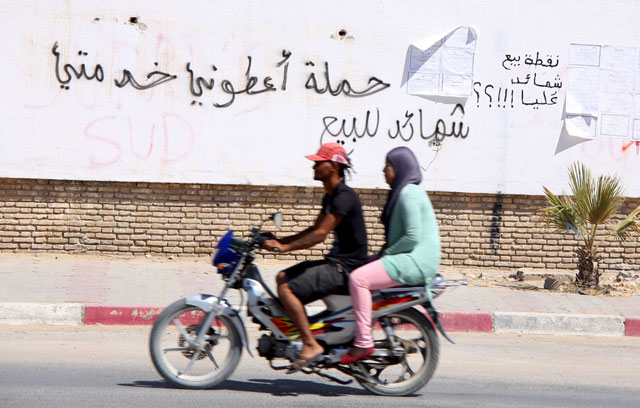METLAOUI, Tunisia — Little stirs at mid-morning in the Tunisian town of Metlaoui; few shops are open and the local phosphate mine lies idle, blockaded by unemployed young men demanding the government fulfill the economic promises of their country's revolution.
Dozens of protest tents are pitched across the rural town with placards calling for "Dignity" and "Work". One ironic sign advertises: "We buy and sell University Diplomas" in a nod to desperation even among many graduates, four years after the revolution that has brought democracy but few jobs.
The camp scattered over hillsides surrounding the mine, normally a major export earner, is among scores of protests ranging from sit-ins and hunger strikes to riots that have erupted this month in southern Tunisia.
"We exhausted all our options," said Zied Salem, who graduated in mathematics nine years ago but made a living from smuggling until a government clampdown ended even that. "After the revolution we had a dream but now they stole our dream."
Salem warned Tunisia's democratically elected leaders that they risked suffering the same fate as autocrat Zine El Abidine Ben Ali, who fell in the 2011 revolution.
"If they do not provide us with jobs quickly, their lives will be darker. We will revolt and expel them like Ben Ali," said Salem, who pitched his tent in front of the phosphate company's office.
Despair is not new. In late 2010, a young man burned himself to death in protest, setting off the revolution that swept Tunisia to democracy and the region into uprisings.
Unlike many other Arab countries which have sunk into autocracy or chaos, Tunisia has fulfilled its political transition. But the economic tensions are testing its stability, with many Tunisians feeling their uprising has yet to deliver on easing living costs or boosting employment and development, especially in marginalised areas of the rural south.
It is unclear how far the protests can spread given the political progress, free elections and new constitution since 2011. But they are a potentially explosive risk for Prime Minister Habib Essid's coalition where his secular Nidaa Tounes Party governs under a deal with the Islamist Ennahda Party.
Official unemployment has risen from 11 per cent before the revolution to around 15 per cent now. Most Tunisians rank the high cost of living among their greatest concerns.
Already the unrest is taking an economic toll. The state-run Gafsa Phosphate Company, Tunisia's main exporter of the chemical, suspended operations in Metlaoui last week after the protests shut down its shipments by rail.
Along with tourism, the country relies heavily on phosphate exports for foreign currency. Officials say the sector, which employs 30,000 people, has lost about $2 billion over the last four years due to protests and strikes.
Lazhar Akremi, minister in charge of relations with parliament, said phosphate production should not be held hostage because it is a national resource. But he has promised the government will announce a package of local investment soon.
This cannot come too soon for Jalel Tabbassi, a local labour union official. "It is a real disaster," said Tabbassi. "People here are just seeking a glimmer of hope, they should start some projects so there is some trust in this government."
Hunger strikes
Tunisia has largely avoided the violence and turmoil afflicting other "Arab Spring" nations such as Yemen, Syria and Libya, thanks partly to compromise deals struck by politicians.
Essid's government, elected late last year, has promised economic reforms to match the political gains. But he has struggled to make progress on policies that international lenders want to cut back hefty public spending and create jobs.
Hussein Abassi, the leader of the powerful UGTT union, has warned the government about the growing social tensions.
President Beji Caid Essebsi has rejected suggestions of a second uprising, saying the state will provide for the jobless, but has warned that it has no "magic wand".
The opposition wants rapid action. "If the government does not take concrete measures in the next two weeks, the situation may become more complicated and perhaps we cannot control it," said Ammar Amroussia, a leader in the Popular Front Party.
Elsewhere, 20 unemployed youths have been on hunger strike for two months in the towns of Gabes and Jbenianas; most are university graduates. In the southern town of Faouar, police fired tear gas on Sunday to disperse hundreds of protesters who threw stones and burned a police station to demand development investment and jobs.
"I am 36 years and I have never had a job. My four brothers and I, we get money from my mother's pension," said Hedi Mansouri, a local protester. "If the government will not give us jobs, they'll get their redundancy letter very soon."
